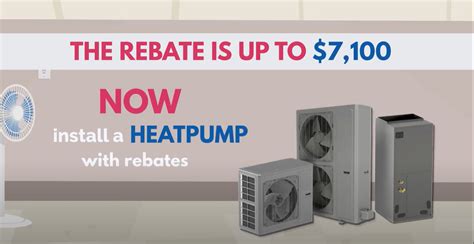Introduction
As energy costs rise and the focus on sustainability sharpens, more homeowners are turning to heat pumps as a viable solution for heating and cooling their homes. Heat pumps are not only energy-efficient but also environmentally friendly. In 2023, several rebates and incentives are available to help you save big on your heat pump purchase. This guide explores the different types of rebates, how to qualify for them, and tips to maximize your savings.
Understanding Heat Pumps
Heat pumps work by transferring heat rather than generating it by burning gas or oil. They can effectively heat your home in winter and cool it in summer, making them a versatile choice for temperature regulation. The two primary types of heat pumps are air-source and ground-source (geothermal). Each type has its advantages, but both can significantly reduce your energy costs in the long run.
Types of Rebates Available in 2023
Federal Rebates
The federal government offers tax credits for energy-efficient home upgrades. Homeowners can claim up to 30% of the cost of installation for qualified heat pumps through the federal Residential Energy Efficiency Property Credit.
State Rebates
Many states have their incentive programs to encourage the adoption of energy-efficient systems. For example, California’s Energy Upgrade CA program provides rebates for homeowners who install qualifying heat pumps. Be sure to check your state’s energy office website for specific details.
Utility Company Rebates
Local utility companies often offer rebates to their customers for energy-efficient upgrades, including heat pumps. These rebates usually require that the heat pump model meets certain efficiency standards. Contact your utility company for details on available programs and application procedures.
Municipal Incentives
Some cities and municipalities offer rebates or incentives for installing heat pumps. These programs can vary widely, so check with your local government or energy office for information.
How to Qualify for Rebates
Qualifying for rebates can vary depending on the type and source of the rebate. Below are general steps to follow:
- Research Eligibility: Visit the websites of federal, state, or local programs to understand their eligibility criteria.
- Choose the Right Model: Ensure that the heat pump model you choose meets the specific efficiency standards required for the rebate.
- Hire Certified Contractors: Many rebate programs require installation by a certified contractor. Make sure to check if your chosen contractor meets the criteria.
- Keep Documentation: Collect all receipts, proof of payment, and any required documentation to submit with your rebate application.
Maximizing Your Savings
To make the most of the rebates available for heat pumps in 2023, consider the following strategies:
Timing is Key
Incentives can change year by year based on budget allocation and policy changes. Check rebate deadlines early in the year to secure the maximum savings.
Bundle Services
If you are considering multiple home improvements, such as insulation or energy-efficient windows, look for programs that offer a bundled rebate for investing in several upgrades at once.
Energy Audits
Before you install a heat pump, consider conducting an energy audit. This evaluation can help identify areas for improvement in your home’s energy efficiency, allowing you to choose the best heating and cooling solution for your needs.
Promotional Offers
Keep an eye out for promotional offers from manufacturers or local installers. Sometimes, they may have their rebates that can be combined with government incentives for additional savings.
Conclusion
Switching to a heat pump not only helps to reduce your carbon footprint but can also lead to significant savings on your energy bills. In 2023, various rebates and incentives are available at the federal, state, and local levels to make this transition even easier financially. Proper research, selecting the right model, and staying informed about the various programs can significantly enhance your savings. Don’t miss out on the opportunity to invest in a more energy-efficient home!
FAQs
1. Are heat pumps eligible for tax credits?
Yes, under the federal Residential Energy Efficiency Property Credit, you can claim up to 30% of the cost of installation for eligible heat pumps.
2. What is the best type of heat pump for a home?
The best type of heat pump depends on your specific environment. Air-source heat pumps are typically suitable for milder climates, while ground-source (geothermal) systems are more efficient in extreme temperatures but have a higher upfront cost.
3. How do I apply for rebates?
Application processes vary by program. Typically, you will need to fill out a form, provide proof of purchase and installation, and sometimes submit additional documentation to prove eligibility.
4. Can I combine multiple rebates?
Yes, in many cases, you can combine various federal, state, and local rebates for even greater savings. Always check the terms of each program to ensure eligibility.
5. How long does it take to receive rebate payments?
Rebate processing times can vary widely depending on the program, but it can typically take anywhere from a few weeks to several months. Make sure to submit your application promptly to avoid delays.
This HTML format article provides a structured overview of rebates for heat pumps in 2023 while incorporating critical sections like the introduction, understanding heat pumps, types of rebates, qualification tips, maximizing savings, a conclusion, and FAQs.
Download Rebates For Heat Pumps
